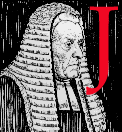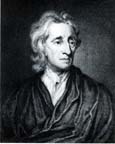 ohn Locke, the great English proponent of what John Stuart Mill would call "the analytic philosophy of mind," and the "father of English empiricism," was born in 1632 at Wrinton in Somerset. The son of a Puritan attorney, he was educated by Puritans at Westminster and studied mathematics and medicine at Christ Church College at Oxford, still a bastion of Royalist sympathies. He held various academic posts there, and became physician and confidential adviser to the Whig first earl of Shaftesbury, in whose house he came to live in 1667. He held a number of official positions until he was expelled from England in 1684 for supposed complicity in Shaftesbury's plots. He then travelled in France and took up residence in Holland, where he came to the attention of the then Prince of Orange, who would shortly become William III. After William had assumed the throne of England Locke came back into favor, and became commisioner of appeals, an advisor on coinage, and a member of the council of trade.
ohn Locke, the great English proponent of what John Stuart Mill would call "the analytic philosophy of mind," and the "father of English empiricism," was born in 1632 at Wrinton in Somerset. The son of a Puritan attorney, he was educated by Puritans at Westminster and studied mathematics and medicine at Christ Church College at Oxford, still a bastion of Royalist sympathies. He held various academic posts there, and became physician and confidential adviser to the Whig first earl of Shaftesbury, in whose house he came to live in 1667. He held a number of official positions until he was expelled from England in 1684 for supposed complicity in Shaftesbury's plots. He then travelled in France and took up residence in Holland, where he came to the attention of the then Prince of Orange, who would shortly become William III. After William had assumed the throne of England Locke came back into favor, and became commisioner of appeals, an advisor on coinage, and a member of the council of trade.
 His two Treatises on Govemment, written in 1679 and 1680, but too radical
(and too dangerous) to be published then, finally appeared in 1690, and were
employed to justify the Glorious
Revolution by denying the validity of the theory of the divine right of
kings. Locke's ideas contradicted the more conservative assumptions which had
been put forth by Hobbes in his Leviathan, and they became the classic
defenses of the political ideals of many seventeenth-century Englishmen: the
origins of the state, Locke maintained, lay in a social contract between the
people and their government, and the people were within their rights to remove
or alter a government which betrayed their trust. Revolution, then, became the
ultimate recourse (and a legitimate one) of a people whom tyranny had deprived
of their rights. By the eighteenth century, Locke's theories had become as orthodox
in British philosophical circles as his friend Newton's had become in physics:
both were advocates of different sorts of natural laws which assumed that the
universe functioned in a systematic fashion.
His two Treatises on Govemment, written in 1679 and 1680, but too radical
(and too dangerous) to be published then, finally appeared in 1690, and were
employed to justify the Glorious
Revolution by denying the validity of the theory of the divine right of
kings. Locke's ideas contradicted the more conservative assumptions which had
been put forth by Hobbes in his Leviathan, and they became the classic
defenses of the political ideals of many seventeenth-century Englishmen: the
origins of the state, Locke maintained, lay in a social contract between the
people and their government, and the people were within their rights to remove
or alter a government which betrayed their trust. Revolution, then, became the
ultimate recourse (and a legitimate one) of a people whom tyranny had deprived
of their rights. By the eighteenth century, Locke's theories had become as orthodox
in British philosophical circles as his friend Newton's had become in physics:
both were advocates of different sorts of natural laws which assumed that the
universe functioned in a systematic fashion.
Locke remained a Christian, maintaining that since our minds are not capable of comprehending reality, we must supplement our knowledge with faith: he was also a strong advocate of religious liberty, writing four letters on the principle of religious toleration. He died in 1704 and was buried at High Laver in Essex.
As a philosopher Locke insisted on the primacy of experimental science and philosophy over the subtle quibbles of traditional Aristotelian modes of thought. His principal philosophical work was his Essay Concerning Human Understanding, published in 1690, although it had taken him seventeen years to complete: it comprises an attempt to determine what aspects of his existence man's understanding was capable of comprehending and which exceeded his power. He believed, with Hobbes, that man had once existed in a state of nature, but that, as a creature created in God's image, man was possessed of reason, and therefore capable of rational behavior, which permitted him to cooperate with other men to form societies and to discern the laws of nature, the most important of which guaranteed him life, liberty, and property. Man acquired knowledge not by means of divine revelation or because he possessed innate ideas, but because his senses permitted him to learn from the external world, and put him in touch with reality. (Locke, like Newton, would be one of Blake's bête noires ). Though all men were born equal, Locke maintained, some, by dint of greater industry, could legitimately accumulate more property than others: the primary responsibilities of legitimate governments, therefore, were to protect life and liberty and to safeguard property. Locke was no democrat: he believed that laborers had neither the time, the education, nor the inclination to make rational political judgements, and should not, therefore, be permitted to have a voice in government, and he denied a role in politics or government to individuals who were not possessed of property.
Related materials
A Bibliography of Selected E-Texts
- An Essay Concerning Human Understanding (text at vt.edu)
- An Essay Concerning Human Understanding (6th edition) (HTML at Columbia)
Content last updated 1988; link last added 17 March 2000